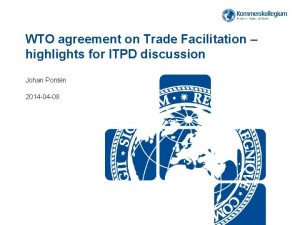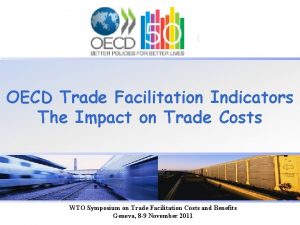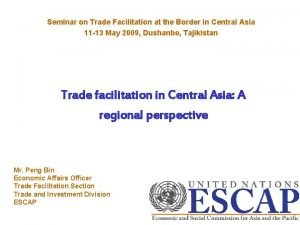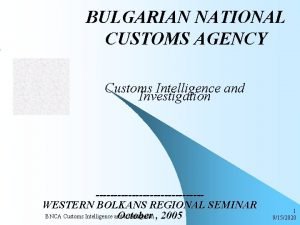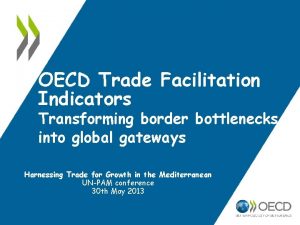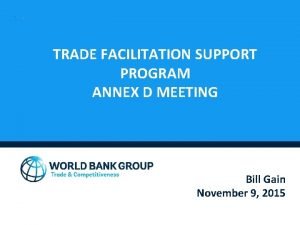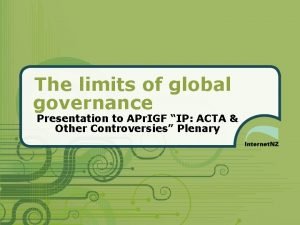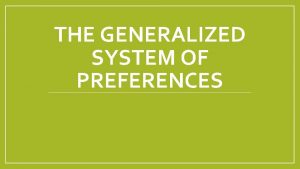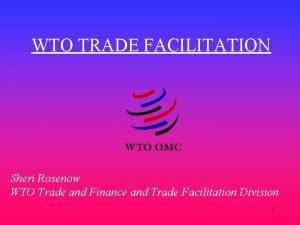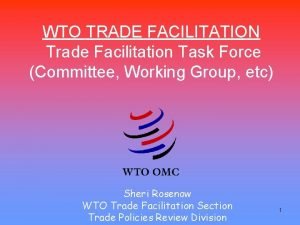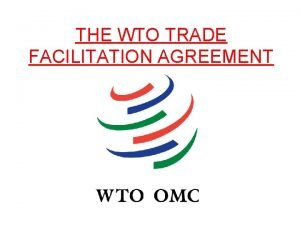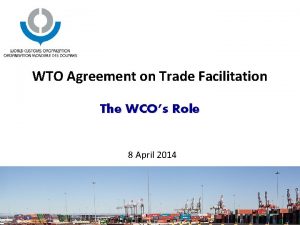WTO agreement on Trade Facilitation highlights for ITPD












- Slides: 12

WTO agreement on Trade Facilitation – highlights for ITPD discussion Johan Pontén 2014 -04 -08

WTO Agreement on TF – How to Package UN/CEFACT Products for Implementation Johan Pontén 4 April 2014

WTO Agreement on Trade Faciliation • The agreement aims at § decreased bureaucracy and costs for international trade § efficient, open and predictable border crossings § facilitated trade and decreased corruption by clarified and enhanced WTO regulations § Based on GATT Articles V, VIII and X

WTO Agreement on Trade Faciliation • Mandate: § Clarify and improve existing GATT Articles: • Article V: Freedom of transit • Article VIII: Fees and formalities connected with importation and exportation • Article X: Publication and administration of trade regulations § Customs cooperation § Technical assistance and support for capacity building

WTO Agreement on TF – Highlights 1 • Timely publication on Internet of information on applicable rules and regulations for import, export and transit • Every country to instate contact points where authorities, companies and other interested can get information and relevant forms concerning import, export and transit. • Customs authorities to give binding advanced rulings on classification and origin of goods in a reasonable, time bound manner. • Administrative appeal to or review by an administrative authority higher than or independent of the official or office that issued the decision

WTO Agreement on TF – Highlights 2 • Goods should be controlled before and after the border crossing to avoid resources being focused at the border. Import documents can be sent in advance, and the goods can be released before duty paid if sufficient guarantees have been made. In this way, the goods can pass much easier. • Risk management systems should be in place to speed up the process at the border and focus inspection activities on identified items that are of high risk. • Each Member State shall have Authorised Economic Operatorprogrammes, where further simplification will be given to companies that have shown that they meet the required standards and hence can get simpler customs procedures. • .

WTO Agreement on TF – Highlights 3 • Accounting should be controlled after the release of goods (postcontrol) to speed up the process at the border • The fees for customs processing shall not be greater than the approximate cost of the actual customs processing, which means that no additional fees may be charged • Perishable goods should be cleared as soon as possible so that they will not be destroyed • Authorities at the border of a country should work together to streamline the border process. • Countries that share a common border shall cooperate to facilitate the import, export and transit through, for example, common controls and customization of business hours

Agreeement on Trade Facilitation Articles Section I • Article 1. Publication and availability of information • Article 2. Opportunity to comment, information before entry into force and consultation • Article 3. Advance rulings • Article 4. Appeal or review procedures • Article 5. Other measures to enhance impartiality, non-discrimination and transparency • Article 6. Disciplines on fees and charges imposed on or in connection with importation and exportation • Article 7. Release and clearance of goods • Article 8. Border agency cooperation • Article 9. Movement of goods under customs control intended for import • Article 10. Formalities connected with importation and exportation and transit • Article 11. Freedom of transit • Article 12. Customs cooperation • Article 13. Institutional arrangement http: //wto. org/english/thewto_e/minist_e/mc 9_e/balipackage_e. htm

WTO Agreement – CEFACT Deliverables in TFIG mapping 1 • Article 1 - none • Article 2. 3 Consultations • Recommendations 4 on National Trade Facilitation Organs • Recommendations 33 on Single Window • Article 3 – 9, 11 -13 none • Article 10. 1 Formalities and Documentation Requirements • Recommendation 1 on the UNLayout. Key • Recommendation 18 on Facilitation Measures related to International Trade Procedures

WTO Agreement – CEFACT Deliverables in TFIG mapping 2 § Article 10. 3 Use of international standards • Recommendation 18 on Facilitation Measures related to International Trade Procedures • Recommendation 25 on use of UN/EDIFACT • Recommendation 26 on commercial use of interchange agreements for EDI • UN/TDED • UN/EDIFACT • Code Lists • Core Component Library (CCL)

WTO Agreement – CEFACT Deliverables in TFIG mapping 3 § Article 10. 4 Single Window • Recommendation 25 on use of UN/EDIFACT • Recommendation 26 on commercial use of interchange agreements for EDI • Recommendation 33 and Guidelines on establishing a Single Window • Recommendation 34 Data Simplification and Standardization for International Trade • Recommendation 35 on establishing a legal framework for international Single Window for trade • UN/CCL • UN/EDIFACT • XML messages

Packaging of UN/CEFACT Products discussion • Can the TFIG mapping be extended? • How can we otherwise package and market our products to help implementation of the WTO agreement?
 Organs of wto
Organs of wto Oecd trade
Oecd trade Trade facilitation meaning
Trade facilitation meaning Ebrd tfp programme
Ebrd tfp programme Trade facilitation meaning
Trade facilitation meaning Oecd trade facilitation indicators
Oecd trade facilitation indicators Trade facilitation support program
Trade facilitation support program Negative agreement
Negative agreement Anti counterfeiting trade agreement
Anti counterfeiting trade agreement Anti counterfeiting trade agreement
Anti counterfeiting trade agreement Nafta
Nafta Generalised system of preferences wto
Generalised system of preferences wto Proposal highlights
Proposal highlights
